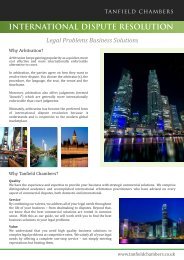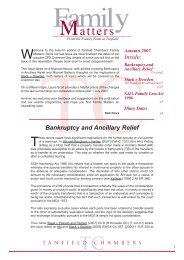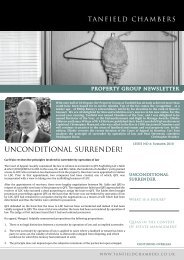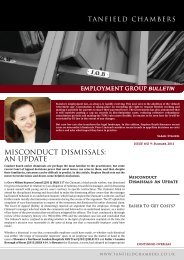Link to newsletter - Tanfield Chambers
Link to newsletter - Tanfield Chambers
Link to newsletter - Tanfield Chambers
Create successful ePaper yourself
Turn your PDF publications into a flip-book with our unique Google optimized e-Paper software.
TRIPARTITE RELATIONSHIPS: EMPLOYED BY END<br />
USER?<br />
The law on whether the end user is the employer has been fairly settled<br />
since James v London Borough of Greenwich [2008] EWCA Civ 35.<br />
The issue is generally whether a contract should be implied between<br />
the worker and end user, which under contractual principles means<br />
that it has <strong>to</strong> be necessary in all the circumstances <strong>to</strong> imply such a<br />
contract. The court in James concluded that the arrangements<br />
between the parties were all explained by two express contracts (ie<br />
worker/agency and agency/end user) and it was therefore<br />
unnecessary <strong>to</strong> imply the existence of another contract. In the absence<br />
of any contract, the claimant could not be an employee of the end user<br />
or, for that matter, a worker.<br />
Muschett v H M Prison Service [2010] EWCA Civ 25 considered<br />
other ways of making the end user liable. Mr Muschett was an agency<br />
worker placed with HMPS. The Court of Appeal concluded that Mr<br />
Muschett was not an employee as there was no contract of service and<br />
focussed on whether he satisfied the wider definition of worker for the<br />
purpose of his discrimination claims (section 78 RRA: a contract<br />
“personally <strong>to</strong> execute any work or labour”). In this context they<br />
investigated whether he was employed under a contract for services<br />
and concluded that he owed no obligation <strong>to</strong> work for HMPS and could<br />
terminate his engagement at any time. There was therefore no<br />
possibility of an implied contract between HMPS and Mr Muschett and<br />
he was not a worker.<br />
CONTRACT WORKER<br />
Leeds City Council v Woodhouse (supra) indicates that in one area at<br />
least the courts are willing <strong>to</strong> be flexible <strong>to</strong> attach liability <strong>to</strong> an end<br />
user. A worker can bring a discrimination claim against a business<br />
which is not his or her employer as a “contract worker” doing work for<br />
that business but employed by a third party who supplies him or her<br />
under a contract with the principal (eg. section 7 RRA). This provision,<br />
normally reserved for agency workers, had not helped Mr Muschett as<br />
he was not an employee of the agency. However, in Woodhouse it was<br />
held that where the Council had sub-contracted its property<br />
management functions <strong>to</strong> a company who employed the claimant, he<br />
could bring a claim directly against the Council. It was not necessary <strong>to</strong><br />
demonstrate the Council had influence and control over the work and<br />
it was not fatal if the work was being performed both for the company<br />
and the Council.<br />
CONCLUSION<br />
Following James and Muschett it is difficult <strong>to</strong> envisage in what<br />
circumstances an agency worker could succeed in persuading a<br />
tribunal of the necessity <strong>to</strong> imply a contract between worker and end<br />
user. Often, they are not employees of the agency either. As a result, as<br />
you might expect, agency workers often remain unprotected from<br />
unfair dismissal. Perhaps less expected, Muschett emphasises that<br />
agency workers may not even be covered by the discrimination<br />
legislation, assuming they are not employed by the agency and<br />
therefore are unable <strong>to</strong> rely on the ‘contract worker’ provisions. It is<br />
concerning if this sec<strong>to</strong>r of the workforce can be discriminated against<br />
with impunity because they fall through the gaps in the legislation.<br />
That said, the suggestion in Woodhouse that these matters should be<br />
left for final hearing may have a strong influence on the way<br />
Respondents choose <strong>to</strong> handle these cases. Faced with a potentially<br />
long and expensive full tribunal hearing (especially in discrimination<br />
cases) it may well be more economically viable for Respondents <strong>to</strong><br />
settle these cases early, even in circumstances where it appears that<br />
there is little prospect of the claim against them succeeding.<br />
employment barristers:<br />
David Berkley QC (1979)<br />
Iain Mitchell QC (1976)<br />
Andrew Thompson* (1969)<br />
Paul Staddon (1976)<br />
David Daly (1979)<br />
Simon Cheves (1980)<br />
Robin Howard (1986)<br />
Chris<strong>to</strong>pher Bamford (1987)<br />
Stephen Heath (1992)<br />
Catriona MacLaren (1993)<br />
Peter Linstead (1994)<br />
Martina Murphy (1998)<br />
Sarah Stanzel (1999)<br />
Laura Robinson (2001)<br />
Andrew Sheftel (2004)<br />
Louise Mankau (2005)<br />
Paul Stevenson (2006)<br />
Gemma de Cordova (2006)<br />
Cecily Crampin (2008)<br />
`<br />
* Joint Edi<strong>to</strong>r of Harvey on Industrial Relations and Employment Law<br />
clerking team<br />
kevin moore<br />
Kevin Moore has been a barristers’ clerk<br />
for 35 years and joined <strong>Chambers</strong> in 1999<br />
having previously been senior clerk in a<br />
highly regarded commercial set. He is a<br />
member of the Institute of Barristers’<br />
Clerks.<br />
Kevin is responsible for the overall clerking of <strong>Chambers</strong> and is<br />
happy <strong>to</strong> discuss any aspect of the service with clients. His flexible<br />
and pragmatic approach <strong>to</strong> the job is appreciated by solici<strong>to</strong>rs who<br />
instruct <strong>Chambers</strong> and has been recognised in the Legal 500.<br />
Kevin is married with 3 grown up children who still manage <strong>to</strong> be<br />
a drain on resources. In his spare time Kevin is a long suffering<br />
supporter of West Ham United FC.<br />
David Wright<br />
David has been clerking for 10 years in<br />
leading commercial and employment sets.<br />
He qualified as a barristers’ clerk in 2002<br />
and is a member of the Institute of<br />
Barristers’ Clerks.<br />
In 2007, David joined <strong>Tanfield</strong> <strong>Chambers</strong> as Principal Employment<br />
and Commercial Clerk where he has put his wealth of experience <strong>to</strong><br />
good use. His combination of hard-work, organisation and reliability<br />
has proved a real asset <strong>to</strong> <strong>Chambers</strong>. When agreeing fees, David<br />
always strives <strong>to</strong> remain client focussed and fair.<br />
In his spare time David studies Hapkido (a Korean martial art) and<br />
enjoys playing football and badmin<strong>to</strong>n. He is also a bit of a film buff.<br />
LAURA ROBINSON & GEMMA DE CORDOVA<br />
<strong>Tanfield</strong> <strong>Chambers</strong>’ dedicated conference facilities are readily accessible<br />
by the mobility-impaired. Please contact the clerks <strong>to</strong> agree fees in<br />
advance, whether on a fixed or hourly rate. Feedback on our service is<br />
welcomed and should be directed <strong>to</strong> the Senior Clerk, Kevin Moore. A<br />
copy of <strong>Chambers</strong> Complaints’ Procedure is available on our website or<br />
on request.<br />
To contact us: T: +44 (0) 20 7421 5300, F: +44 (0) 20 7421 5333, DX: 46 London Chancery Lane, E: clerks@tanfieldchambers.co.uk<br />
Address: <strong>Tanfield</strong> <strong>Chambers</strong>, 2-5 Warwick Court, London, WC1R 5DJ






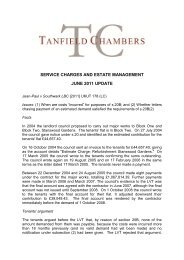
![Re Clarise Properties Ltd [2012] UKUT 4 (LC) - Tanfield Chambers](https://img.yumpu.com/36301708/1/190x245/re-clarise-properties-ltd-2012-ukut-4-lc-tanfield-chambers.jpg?quality=85)


